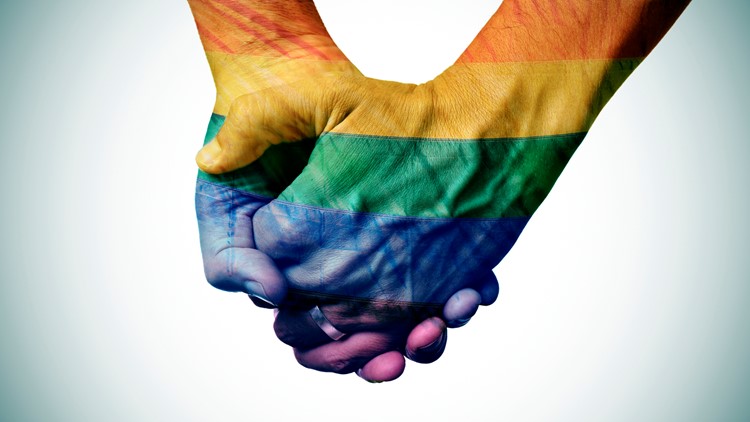Gay conversion therapy is more than just a "South Park" episode.
The controversial practice – which uses emotionally abusive, often extreme methods to "cure" people of their homosexuality – has been a subject for comedic fodder in the ribald animated series, as well the 2000 film satire "But I'm a Cheerleader."
But reparative therapy is still a frightening reality for thousands of LGBTQ people, who often enter "ex-gay" programs at the insistence of pastors, counselors and loved ones. According to a recent survey by the Williams Institute at UCLA, which studies sexual orientation and gender identity law, nearly 700,000 LGBTQ adults in the United States have gone through conversion therapy (which is legal in 41 states). Another 57,000 teens are expected to receive treatment from religious or spiritual advisers before they turn 18.
Two new films are aiming to show the painful realities for kids in gay conversion programs: awards contender "Boy Erased" (in theaters Nov. 2) and "The Miseducation of Cameron Post" (opens Friday in New York and Los Angeles, expands wider through summer), which won the grand jury prize at Sundance Film Festival in January (the fest's top honor).
"Boy" stars Lucas Hedges and is based on the 2016 memoir by Garrard Conley, who entered Love in Action, an ex-gay Christian ministry, after being outed to his parents (played by Nicole Kidman and Russell Crowe) in 2004 at age 19. The fictional "Cameron Post," adapted from Emily M. Danforth's young-adult novel, stars Chloe Grace Moretz as a high schooler in the 1990s who is sent to a treatment center called God's Promise after she's caught kissing another girl at prom.
The teams behind both films break down what really happens in conversion therapy:
Same-sex attraction is likened to 'cannibalism.'
For research, "Cameron Post" director Desiree Akhavan and co-writer Cecilia Frugiuele interviewed survivors, watched sermons and read materials used in ex-gay programs.
One of their most surprising findings was the concept of " 'cannibal theory,' which is that if you're attracted to someone (of the same sex), you're not actually in love with them – you just want to be them," Akhavan says. One survivor told them that "on his first day, they forced the men to admit if they were attracted to someone in the room and then list all the reasons why they found him attractive. Then the counselor would 'prove' to you that those were just traits you just wanted for yourself."
Participants are taught that everyone is born straight.
Mathew Shurka, who was a consultant on "Cameron Post," spent five years in one-on-one and group therapy after coming out to his dad in 2004 at age 16. As part of his "treatment," Shurka's therapist told his dad to get him a prescription for Viagra so he could perform better sexually with girls and avoid speaking to his mom and older sisters because he was "over-feminized."
"He told (my parents) that because I was 16, the less experience I had sexually, the better chance I had at overcoming same-sex attraction," says Shurka, who now works for the Born Perfect campaign to end conversion therapy. His therapist explained that "everyone is born heterosexual" and anyone who isn't is reacting to childhood traumas. "If your child goes through therapy and treats those traumas, the same-sex attraction will go away and the opposite-sex attraction will be there, because that's who we innately are."
They're forced to re-enact traumatic experiences.
At one therapy camp, Shurka and other men were asked to re-create the moments that "made" them gay. One man told a story about how he was forced to give his male babysitter oral sex as a young child, which other campers acted out in front of him. But during the re-enactment, they "changed the story, like he breaks free or makes sure it doesn't happen," Shurka says. "The point is that you can change your past, but it's really upsetting, because the (victim) who's sitting and watching is screaming and crying."
Conley recalls a similar experience at Love in Action, when program directors staged a fake funeral for a young man.
"They had a closed casket and pretended he was in there and said, 'Oh, he died of AIDS – we should mourn him,' " Conley says. "His family had to walk up to the casket and say their final goodbyes and talk about how he had fallen into sin because he had sex with a man. It scared him to death."
'Deviant' behavior is admonished.
Any belongings deemed secular or feminine were confiscated upon Conley's arrival at the Love in Action facility in Memphis, Tennessee, where participants were chastised for how they dressed or spoke.
"There's one moment briefly in the film where I'm standing with my (hand on my hip), and a woman comes over to me and physically moves my hand down and says that she's going to have to report me," Conley says. "It made all of us extremely self-conscious. All of us who survived, we retained many of those habits that they placed in us, and it takes years to get over them."



